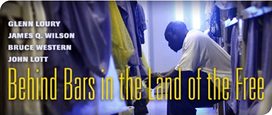Bruce Western somehow manage to transpose my factual statements into political slogans with which he disagrees. I said prison deters. It does: see the research work of Daniel Nagin, Steven Levitt, and many others. He denies this (for reasons he does not explain) but then adds that the certainty of punishment deters crime. But the prospect of going to prison is punishment, and increasing the certainty of that, as Nagin and Levitt have shown, reduces crime. How, then, can he say that prison does not deter crime? I am puzzled.
Perhaps he means, as he later suggests, that having more police deters crime without regard to prison. But as my research and that of Robert Sampson has shown, it is not the number of police but how they are deployed that affects the crime rate. The reason is that deployment, properly done, increases the chance of an arrest being made, and the arrest can then lead to a prison sentence. He cannot accept the idea that society, and especially criminal victims, attach a high value to retribution. Apparently he has this view because he thinks that retribution will be directed at the most disadvantaged and dishonored groups in society. But that is hardly the case: If an ordinary first-time burglar had broken into the Democratic Party headquarters at Watergate, he would, if caught, probably have been placed on probation. But when, as it turned out, the first-time burglar was sent by the White House, he went to prison.
Suppose a woman has been raped. Would she be satisfied with sending the rapist to an employment program? I doubt it. She would expect him to be imprisoned whether he was a Harvard student or a high-school dropout. I think it is time for Western to tell us concretely what polices he would favor in lieu of prison and for what offenses. Glenn Loury does not want to discuss policies, he only wishes to exchange views about values. Is this also Western’s view? I cannot tell.

